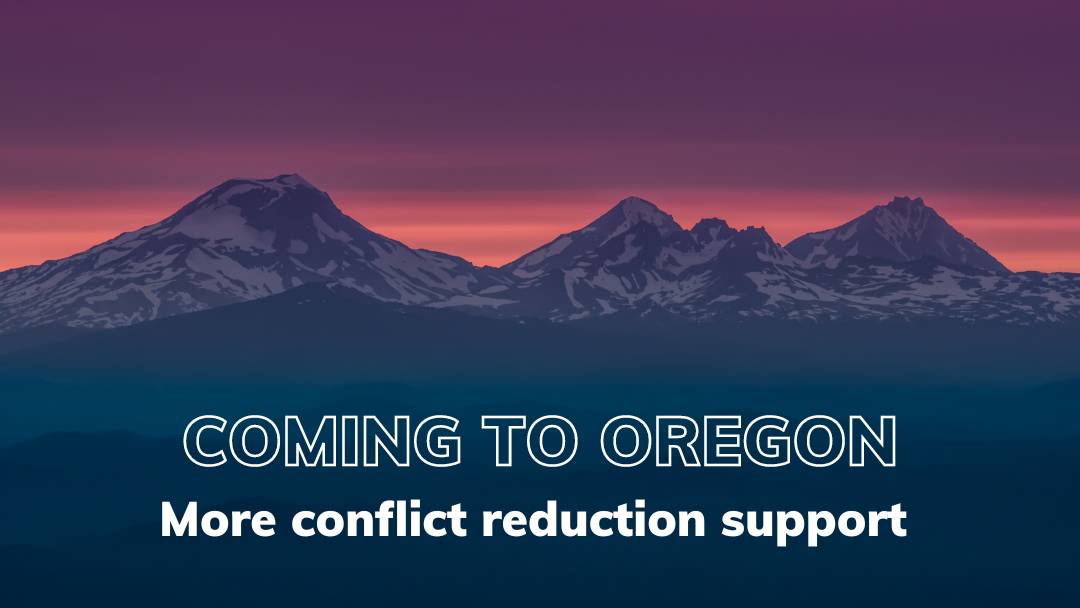Oregon ranchers get boost on innovation for wildlife-livestock conflict prevention
BEND, Oregon – As wolves expand across Oregon, livestock producers in the state need more tools to avoid conflicts with these crafty predators. Funding from USDA’s Natural Resources Conservation Service announced in August will help develop and test these tools. Western Landowners Alliance received a $100,000 Oregon Conservation Innovation Grant (CIG) a second phase of their landowner-led strategies for conflict reduction project.
“In Phase one we saw just how many seemingly small innovations landowners are making in the Northeast part of the state, from solar-powered GPS collars for guardian dogs to game camera tracking tools to carcass management programs to improved data systems for range riders and more,” said Ellie Gage, Oregon Outreach Associate for Western Landowners Alliance. “We are scaling that up and testing the impact of those innovations across more of Oregon in phase two.”
“In 2022 our ranch suffered devastating losses to our cattle herd through wolf depredation. The financial help provided through WLA and the OR CIG was a much-needed lifeline of support,” said Oregon rancher Tom Birkmaier. “The funding helped with the necessary range riding to reduce wolf/cattle conflict as well as funding for our on-ranch predator monitoring system and other nonlethal applications.”
Phase two of the project will accelerate innovation and adoption of producer-implemented non-lethal predator management alternatives across Baker, Umatilla, Union, and Wallowa counties. Western Landowners Alliance will facilitate peer-to-peer stakeholder knowledge exchange and partner coordination to develop guidelines for successful local delivery of conflict reduction programs.
Project partners, including many Oregon ranchers and producer associations, will inform conservation delivery of non-lethal practices on working landscapes to enhance agricultural productivity. Most of the resources will be regranted to these partners to put practices on the ground and collect data on their effectiveness.
“Prairie City operates and maintains an 8-cell carcass composting facility with the goal to manage road-struck deer and prevent scavengers from being struck. The partnership with WLA on the Oregon CIG has been a huge asset to us. Before this partnership, our biggest challenge was budgetary and staffing shortfalls—funding,” said Chris Camarena, Director of Public Works for Prairie City. “The CIG partnership was a huge relief for the sustainability of our facility and has helped our conservation efforts and being good stewards of the land. The networking resources that were available to us through the OR-CIG have been great too.”
“We’re focused on helping livestock producers remove raven attractants—such as livestock carcasses—in sagebrush habitat, as ravens are a prolific sage grouse nest predator,” said Baker Sage-grouse Local Implementation Team coordinator Morgan Solomon, a project partner. “However, we also believe that carcass management tools will help livestock producers in maintaining healthy operations in the presence of wolves. This brings new meaning to the saying ‘what’s good for the bird is good for the herd!’”
#
For more information about the CIG program, visit https://www.nrcs.usda.gov/wps/portal/nrcs/main/national/programs/financial/cig/
For more information about Western Landowners Alliance’s conflict reduction work, visit https://westernlandowners.org/working-wild-challenge/
Join WLA to stay up to date on the most important news and policy for land stewards.
Become a member for free today and we will send you the news and policy developments critical to the economic and ecological health of working lands.
WLA works on behalf of landowners and practitioners throughout the West. We will never share your contact information with anyone.
©2026 Western Landowners Alliance • PO BOX 27798, Denver, CO 80227 • 505.466.1495
Western Landowners Alliance is a 501 (c)(3) non-profit recognized by the IRS.
Tax ID: 46-1346488
